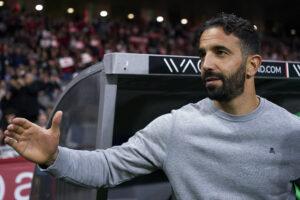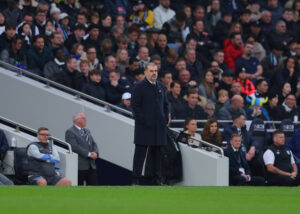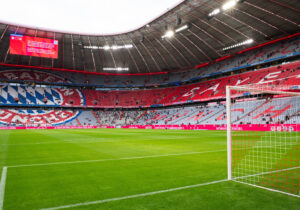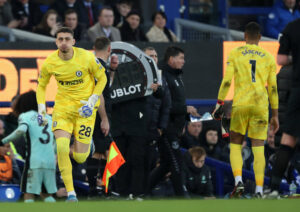Welcome back to the latest series of articles from Last Word on Football. This time we look back on the footballers who many class as Premier League legends. Players who wowed the crowd, frustrated the opposition, scored great goals and inspired their team to glory.
Today we look at a player who was often considered as the support man, never the main man. However, his contribution to the team could never be questioned. A scorer and supplier of goals, he would become a legend for one club in particular and his nation.
Premier League Legends: Niall Quinn
Where It All Began: Arsenal
Niall Quinn moved to England from Ireland at the age of 17. An unsuccessful trial at Fulham led to another at Arsenal where he would sign his first professional contract.
Quinn impressed in Arsenal’s third and reserve teams and was moved to the first team after scoring 18 goals in 18 reserve team games. He made his debut for the Gunners in December 1985 and would score in a 2-0 victory over Liverpool.
Under new manager George Graham, Quinn blossomed and became a regular for the Gunners during the 1986/87 season. It was during this campaign that he helped Arsenal to a fourth-placed finish and a League Cup Final victory over Liverpool.
As Arsenal became more dominant, manager George Graham strengthened his squad, thus leaving Quinn struggling for game time. With his opportunities limited due to the form of the likes of Alan Smith, Quinn requested a transfer at the beginning of the 1989/90 season.
The target man would get his wish to move on with his career in March 1990. He left Arsenal having scored 20 goals in 81 starts.
Move to Manchester City
£700,000 secured Manchester City the services of Quinn and he immediately repaid their faith with a goal on his debut against Chelsea. The big striker would score 22 goals in his first full season at Maine Road as City finished fifth.
During this season, Quinn stepped up to take over in goal against Derby County. Having scored early in the game, the striker took over from Tony Coton after the keeper was sent off. Quinn would be the hero of the game as he saved a penalty to help his side win the game 2-1.
A cruciate injury meant Quinn would miss the majority of the 1993/94 season. It also meant he was unable to travel to the USA with the Republic of Ireland for the 1994 World Cup.
Quinn would spend a further two seasons with the Citizens before moving on. He would exit in the summer of 1996 after playing 240 games in all competitions, scoring 76 goals.
Niall Quinn’s time at City was classed as successful; however, the best of Quinn was still to come.
Success at Sunderland
Quinn would join his last club Sunderland in the summer of 1996. Manager Peter Reid paid a then club-record £1.3 million for the big striker. The Black Cats had just been promoted to the Premier League and Reid wanted a proven top-flight forward. Having been Quinn’s manager at Manchester City, Reid knew all about the Eire international.
Quinn’s life on Wearside began well, scoring twice in a 4-1 win at Nottingham Forest. However, his and Sunderland’s good fortune would be short-lived. Quinn suffered a knee injury and would miss six months of the season. Without the help of their record signing, Sunderland were relegated.
Relegation was a blessing in disguise for Quinn as prior to the 1997/98 season, Sunderland signed striker Kevin Phillips. One of the most prolific strike forces for the next several seasons was born.
Sunderland returned to the Premier League with the Quinn and Phillips partnership terrorising defences. Anyone doubting their ability to replicate their form in the top-flight were quickly silenced. The little and large duo continued to dominate the best defences in the country as the Black Cats took the top-flight by storm.
During the period between the summer of 1997 and the end of 2002, Quinn and Phillips would score almost 200 goals between them to go down as one of the best strike partnerships to wear the famous red and white stripes and to grace the Premier League.
Quinn would stay on Wearside until he called time on his career in 2002, just after his 37th birthday. Quinn summed up his time at Sunderland with this now legendary quote:
“I learned my trade at Arsenal, became a footballer at Manchester City, but Sunderland got under my skin. I love Sunderland.”
Niall Quinn and his Disco Pants
Quinn like many fan-favourites had his own terrace song. The song ‘Niall Quinn’s Disco Pants’ was born while he was at Manchester City; however, the song did not stay there when he left. It followed him to Sunderland where it was even released as a single. The song can still be heard at the Stadium of Light to this day.
Testimonial
Quinn was granted a testimonial at Sunderland in the summer of 2002. The Black Cats faced the Republic of Ireland at the Stadium of Light. The game was won by Eire 3-0 with Quinn playing 45 minutes for each team. However, this was not the main story.
The game made over £1 million and Quinn gave every penny to charity. In normal circumstances, players would receive a playing fee. In this game, instead of a fee, they received a letter from a sick child from one of the charities supported by Quinn.
International Career
Quinn played for the Republic of Ireland at under-17 and 18 levels before making his debut for the senior side in 1986. He would go on to represent his country at one European Championship and two World Cups.
He ended his international career after the 2002 World Cup after playing 92 times and scoring 21 goals. At the time his goal tally made him his country’s all-time top scorer.
After Retirement: Manager, Chairman, but Always a Fan Favourite
In 2006, Quinn, along with a wealthy Irish consortium took control of Sunderland. Quinn became chairman and also manager for a short time. The Black Cats appointed Roy Keane as manager just several games into the season which allowed Quinn to concentrate solely on his chairman duties.
Under the guidance of Keane as manager and Quinn as chairman, Sunderland, now back in the Championship, successfully regained their Premier League status at the first attempt by being promoted as champions.
Quinn and his consortium spent millions in the transfer market in an attempt to make Sunderland a top club once again challenging for honours. They failed to do this; however, the club would stay in the Premier League until 2017. By this time, Quinn had been gone from the club for several years after being replaced by American businessman Ellis Short.
Niall Quinn: Underrated, Selfless, Goalscorer
Niall Quinn will be remembered as a Premier League legend. He was at times underrated and put his team first. Quinn was a big target man who not only had heading ability, he could also score a range of goals. His time partnering Kevin Phillips at Sunderland will never be forgotten. He alongside Phillips gave opposition defenders nightmares.
He was also a gent who was a fan-favourite for not just his displays on the field but his acts of kindness off it. His donations to charity are well documented but his willingness to do the right thing was also a trait of his.
For example, after Sunderland had played Bristol City away from home, fans on the plane home, after seeing Quinn get on the plane, broke into song. The airline ejected the fans. Quinn believing this was unfair also exited the plane. He proceeded in arranging taxi’s and minivans to get the fans home.
Main Photo






